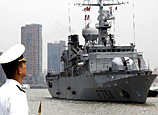
Government officials vowed to enhance their services, simplify procedures and step up negotiations with foreign governments to help Chinese companies tap overseas markets.
Liu Hongkuan, deputy director of the National Development and Reform Commission's department of foreign capital and overseas investment, on Wednesday encouraged Chinese companies investing abroad to prioritize the energy, natural resources, high-tech, high-end manufacturing, and infrastructure building sectors.
At the opening session of the Chinese Enterprises Outbound Investment Conference in Beijing, Liu pledged that the government will play a major role as a facilitator in the continuous rise of China's outbound direct investment.
The government will also help with more negotiations on investment protection agreements with foreign countries, simplify and reduce administrative approval procedures related to outbound investment and speed up the establishment of a framework concerning relevant laws and regulations, he said.
Liu also said China will actively provide domestic companies with sufficient and updated information about global markets, standardize environmental protection activities and better people's livelihoods to build up a good global image.
Wan Jifei, chairman of the China Council for the Promotion of International Trade, echoed Liu by saying that the biggest barrier Chinese companies face when they go abroad is insufficient information about the policies in China and foreign countries.
Liu's remarks come at a time when Chinese companies are more frequently challenged by investment barriers set by other countries with the nation's overseas direct investment increasing since the financial crisis.
Western countries have also continuously alleged that Chinese companies overseas have failed to implement corporate social responsibility.
"The core task for the Chinese government is to create a convenient and smooth environment for domestic companies," said Zhao Jinping, a senior researcher with the Development Research Center of the State Council.
Zhao also suggested the Chinese government should enhance international investment cooperation and improve outbound investment laws and regulations.
Chen Jian, vice-minister of commerce, said in a recent interview with China Daily that it is a pressing task for China to make the nation's outbound investment more convenient over the next decade.
Despite the global drop in foreign direct investment, China's ODI has been on the rise over the past five years, and China ranked as the fifth largest investor worldwide in 2012.
According to the Ministry of Commerce, the nation's ODI in the non-financial sector in 2012 rose by 30 percent from a year earlier to $77.2 billion, while global ODI dropped by 18.3 percent year-on-year.
President Xi Jinping said during the Boao Forum for Asia Annual Conference 2013 that China's accumulative ODI in the next five years will reach $500 billion, while the nation set a target of 15 percent for this year's ODI growth.
In 2012, the government's annual work report pointed out for the first time that China encourages its companies to invest in manufacturing, raw materials, agriculture, energy, services and infrastructure.
According to Liu Jinsong, deputy director of the department of international economic affairs with the Ministry of Foreign Affairs, China has many good opportunities to invest in infrastructure in developed as well as developing countries.
"Infrastructure should be a priority. China has the willingness, capacity and the reputation to do it," he said.
The central government recently vowed to invest more in the energy and infrastructure sectors in the United States, the world's largest economy and largest nation in terms of the foreign direct investment it absorbs, amid calls for local Chinese governments and American states to strengthen their economic ties.
















 Beijing's first H7N9 patient discharged
Beijing's first H7N9 patient discharged


![]()
